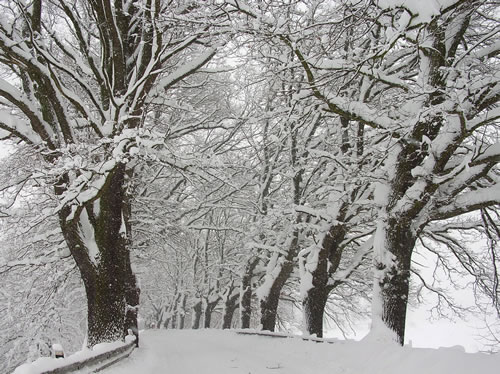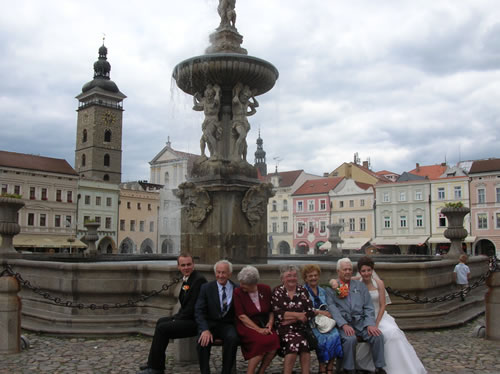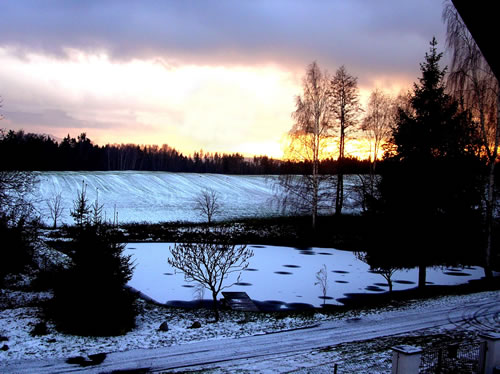Strangers in Czech Lands
To Receive and to Give Back
By Pearl Harris

|
|
Winter in the Czech Republic. Photo ©Pearl Harris.
|
“Travel is fatal to prejudice, bigotry and narrowmindedness… and many of our people need it solely on these accounts.” — Mark Twain.
In March 2002, two elderly immigrants to a small Czech village had no conception of the enormity of the learning curve they were to experience in the next eight years.
Communist rule of over 40 years had left its indelible scars on the people of the Czech lands when my husband and I decided to uproot ourselves from South Africa to settle permanently in Central Europe.
Our new home in South Bohemia, close to the Austrian border, is in a village whose population is so small that, when counted together with the neighboring village, totals 766. It is no wonder, therefore, that these two crazy cizinci (foreigners) were at first openly stared at and peered at through lace curtains.
Lucie
Fortunately for us, next-door neighbor, Lucie, was an exception to the initial mistrust encountered. A charming lady in her mid-thirties who lives alone with her poodle, she welcomed us with her broad grin and generous spirit. When the mammoth container of our worldly goods from South Africa arrived on our doorstep, a beaming Lucie appeared, armed with her “trolley” — an essential piece of equipment in every home here, used for moving heavy goods.
She would have instantly unpacked all our furniture single-handedly, including our rather weighty piano, had we not stopped her by saying that we needed the removal people to do the job for us, in case of insurance claims. Her kind intentions, however, were not lost on us and were merely the forerunner of hundreds of such neighborly acts.
Lucie is a strong, powerful lady, all muscle, who owns no modern trappings such as a car and goes everywhere either by bus, on foot, or on her trusty bicycle. She is totally independent, equally capable of chopping wood, building a fence, baking a cake, or fixing any household electrical problem. Large in stature, Lucie has a heart to match. Unmarried, she cared for her ailing parents until their deaths and has gradually come to regard us as her surrogate parents. Lucie speaks only Czech and Russian, so our only communication is by necessity either in our broken Czech or the more effective sign language.
Our first European winter came as a shock to the immigrants from sunny South Africa. The small Škoda sedan was totally inadequate to negotiate the steep, snowy track up to our garage. No problem to Lucie who, realizing our plight, immediately flung open her gate and insisted that we park our car in her garage for the winter – her home, unlike ours, having access to the main road. Every freezing, dark evening as we wearily returned home from teaching in the city 20 miles away, the gates would be open for us, with Lucie’s garage light and warm smile burning a bright welcome inside.
Pet care facilities in the Czech Republic are not what we were accustomed to, boarding kennels being scarce and ill-equipped, in our region at least. When it came to vacation time, the problem of what to do with our dog and cat were again easily solved by Lucie who took over their care in our absence – a task she accomplished with great aplomb, even treating our Labrador to champagne and a home-cooked meal of goulash one New Year’s Eve!
A surprising early lesson we learned was that, although English is vastly different to the complex Slav language, with kindness, intelligence, a sense of humor and sign language, total communication and understanding are indeed possible. Lucie, with her generosity and tolerance, is living testimony to this fact.
Petra
During my early days as an English teacher, I met Petra, an attractive forty-something honey-blonde, who asked me to take her for intensive English lessons. I found her to be a dedicated and enthusiastic student, and a glowing, kind human being. Growing up in Czechoslovakia had not been easy for her. Her grandfather, a farmer who did not agree with handing his farmlands over to the State, had all his property confiscated soon after the Communist take-over of Czechoslovakia. For his simple dream of holding onto the land which had been his family’s for centuries, Petra’s grandfather was thrown into prison for many years.
Petra’s family suffered great hardship during his incarceration. Doors were shut in their faces and Petra and her siblings were prevented from undertaking any tertiary studies. She had always dreamed of teaching English, albeit being forced to study only Russian as a second language at school. Petra married young, devoting the next twenty years to bringing up four children. However, her dreams of being a teacher were never entirely snuffed out and, after the transition from communism to democracy, Petra, at the age of 40, was finally free to realize her long-shelved ambitions.
Doggedly she began to study the English language. By the time I got to know her, Petra was already a fluent speaker, qualified to teach up to the pre-intermediate level. Obviously a born teacher, she loved her students and reveled in her chosen career. Petra was grateful for my aid in the preparation for her advanced English examination, which she passed with flying colors.
When my husband retired from his lecturing position at the local University, Petra made it her personal mission to ensure the best possible conditions for his retirement. Doing all in her might to navigate the tortuous Czech bureaucracy, she was able to establish that Ian was eligible for a lengthy spell of paid sick leave. Not only did my husband get a percentage of his last salary paid for the next year, but his medical insurance premiums and social security contributions were also fully paid by the State.
The Czech health care system is remarkable, with all medical and dental care, hospitalization, medication and specialist treatment being free to citizens who pay only a small monthly premium.
Children have totally free medical care through completion of their university education. Recently, when a fee of US$1.50 per doctor’s visit was introduced, as well as a US$1.50 fee for each prescription, there was caused widespread dissatisfaction, near riots, and even a change of government!
Petra also informed my husband that he qualified for a Disability Pension as, being a British EU citizen, he is entitled to all the benefits of a Czech. She then helped him through the reams of paperwork involved in this application, with the final outcome that he was granted a life-long State Disability Pension, including additional perks, such as a fuel allowance and discounted travel within the Czech Republic.
Hana
While Petra has been our Czech guardian angel, Hana has definitely been our Slovakian one. Hana is a petite dark-haired woman who called at our home to arrange for private English lessons. She could not speak one word of English, making initial communication very difficult. In a very short time, however, she showed her true colors, exceptional intelligence, and heart of gold. I again learned that there is really no language barrier to kindness.
Hana took it upon herself to help us, as foreigners in a hostile land. To her, the Czech Republic is also “foreign,” as she was born in Slovakia. Her family had been devastated when she married a Czech and left home to live in a “far-off country.” When she heard about our only daughter in the U.S. and the rest of our family in South Africa, her sympathy knew no bounds.
Annually, Hana helps us with the complicated Czech Income Tax returns which we could not even begin to read, let alone complete. Nothing is ever too much trouble for her. After hurricane-force winds ripped a bit off our roof, Hana, hearing of our plight, persuaded her husband to spend his entire Sunday perched precariously on the summit of our steep roof, where he did a professional repair job, with his wife supporting the ladder below. Needless to say, Marek flatly refused to accept any payment for his labors.
Floods
Following torrential rain falls, the worst floods in three centuries struck the Czech Republic in 2002. Cut off from the outside world, TV or radio news due to power outages, it was only when the phone lines were re-connected several days later and family and friends from around the world started frantically calling, that we learnt of the full extent of the flooding in the Czech Republic. More than 200,000 people had been evacuated from their homes, with the historic centers of Prague, České Budějovice, and Česky Krumlov the worst hit.
The Czechs are a hardy nation. Only three days after the Vltava and Malše rivers had burst their banks, flooding all cities and towns in their vicinity, I walked through the eerily empty streets of České Budějovice and marveled at the resilience, acceptance, and plain “let’s-get-on-with-it” attitude of the residents.
On the semi-deserted, normally bustling, medieval town square, I gazed in shock at the destruction wreaked by the forces of Nature which had, nevertheless, not managed to dampen the spirit of the people. Fire-fighters were out pumping water from flooded buildings, trash and waterlogged items were neatly stacked in enormous, wet piles on the curbs for collection by refuse trucks. Storekeepers were calmly sweeping out and mopping up mud-soaked premises, as if this were a daily occurrence.
Everywhere people were quietly taking stock, working together, determined to overcome this calamity. In the Czech Republic, life is tough. Cheap, unskilled labor is not easily available, so what has to be done, has to be done by the sweat of one’s own brow.
One complete section of the embankment of the Vltava had collapsed into the swirling waters of the still raging river. Tall trees had been uprooted by the floodwaters and the entire riverside park was waterlogged. Already the droning, heavy machinery was out, tree-fellers were making the trees safe and mud was being scooped up by powerful equipment, rubble was being collected and disposed of. Everywhere the presence of a huge police and military force was evident. I had the distinct feeling that things were under control and that there was nothing that this country and its hardy inhabitants could not handle.
A History of Hardships
Between the years 870, when Prague Castle was built, and 1993, when the Czech Republic finally became an independent state, the Czech nation has endured many hardships and lived through countless changes: the Nazi occupation of the Second World War, the Prague Uprising of 1945, the Prague Spring of 1968 and the Velvet Revolution of 1989. The Great Floods of August 2002 will certainly, too, go down as one of the major events in the annals of history. To the Czechs, however, this was just another hardship to be borne and overcome.
Later in the day, I watched a wedding procession enter the Town Hall, bringing with it the promise of new life. The colored flowers bloomed in defiance on Námeští Přemysla Otakara II, the largest town square in Europe.
Those of us who have not at first hand experienced Communist rule cannot conceive of a life where all boundaries are set and controlled both physically and mentally by the State. It might justifiably leave a residual feeling of persecution and bitterness in the best of us. Seemingly not so, for most of these remarkable people!
On the contrary, the Czechs do not wish to dwell on the past, but rather to move forward to a brighter future. It is difficult to extract any information at all from my students as to what everyday life was really like in the Communist era. They will reply briefly and politely to specific questions, but then return to the more important task of actually living in the 21st century.
A Czech Wedding
This inherent joie de vivre is no better illustrated than at a Czech wedding. This is no hour-long or day-long event, but a continuous 2-day celebration, at the very least. Czechs are generally inhibited and shy towards foreigners or strangers, not easily admitting them into their close inner circle. It was therefore with great humility that my husband and I accepted the invitation of Jan, one of my English students, to his wedding to longtime girlfriend, Anna.
The civil ceremony took place one bright Saturday morning in June in the Town Hall of České Budějovice, capital of South Bohemia. We gathered with family and friends to witness the marriage within the regal atmosphere of the ornate wedding chamber. Official photographs were taken afterwards in the Námeští Přemysla Otakara II square, following which we joined the merry convoy of beribboned cars to the village of Černice on the fringes of the city, where the wedding party was to occupy the small village for the rest of the weekend.

|
|
The bridal couple pose with their grandparents in the main square, Ceské Budejovice, after their marriage ceremony. Photo ©Pearl Harris.
|
Guests were treated to a sumptuous formal sit-down wedding lunch, with the minimum of speeches — by the groom and the bride’s father — after which we were shown to our rooms in the hotel where we were to be accommodated for the night, courtesy of the bridal couple’s parents. With the strictly enforced zero tolerance of drunk-driving, nobody was going to be allowed to drive home that night.
Guests, having changed into informal wear, then began the real party in the adjacent courtyard of the hotel, where a bandstand was set up and a lamb was already slowly roasting on the spit. Barrels of beer were lined up and the groom’s father offered around generous tots of his famous potent, home-brewed Slivovice (plum brandy). The bride and groom’s mothers passed along trays laden with home-baked delicacies to guests seated in a circle around the glowing wood fire.
Guests joined hands in traditional dancing in a large circle on the grassed area in front of the band, which played on until dawn was breaking over the distant hilltops. The two foreigners, with their scanty knowledge of Czech, were welcomed as one of the family. This special occasion was a major stepping stone for us to acceptance, after a long, difficult path of being mere cizinci.
Teaching English to Assist the Czech People
An eagerness and willingness to adopt western culture in all its aspects has in turn inspired me to assist the Czech people in their thirst for acquiring and perfecting the English language. In this way, I feel like a small but vital link in the chain of a people whose lives were sorely interrupted and stunted by communism, but who now have the guts and determination to get up and go, shake off the legacy of the past and catch up with — and even to excel over — the rest of the world.

|
|
A typical pond in South Bohemia in the winter sunset. Photo ©Pearl Harris.
|
Mark Twain hit the nail on the head with his statement that travel is the antidote to bigotry. The Czech nation, however, is living proof that, even denied the opportunity of travel, one is still able to overcome this handicap with an open mind and a willingness to admit strangers into your world.
Pearl
Harris was born in South Africa where she spent
most of her life before emigrating to the Czech Republic
with her husband, Ian, in 2002. Besides travel, her
passions are writing, photography, reading, and animals.
She has a B.A. in English & Linguistics, post-graduate
Diploma in Translation and TEFL qualification. Formerly
an EFL teacher, Pearl now freelances and you can find more information on her website about her work proofreading & editing.
Pearl has been widely published in magazines
and on the web. Her travel memoirs, From
Africa to Buková, and the sequel Where
is my Home? are available on Amazon.com.
|
